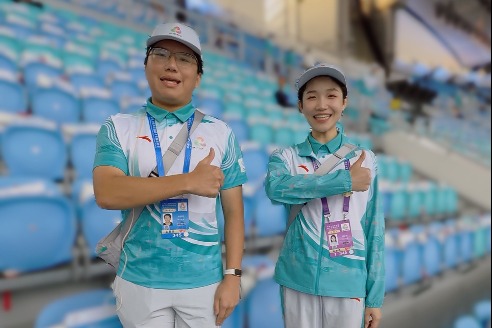HSK 3.0 to be launched as test's global reach expands


The number of people taking the Chinese Proficiency Test (HSK) is expected to reach 750,000 this year, signaling strong and sustained growth for the global Chinese language proficiency assessment, according to the Center for Language Education and Cooperation of the Ministry of Education.
This projection follows a robust first half of the year, which saw 414,000 candidates — an increase of 19.6 percent year-on-year. The cumulative number of HSK test-takers is set to surpass 8.5 million, underscoring the exam's expanding global footprint, the center said.
The test has experienced remarkable expansion over the past two decades. From 2004 to 2024, the scale of global HSK exams surged more than 22-fold, with the annual number of candidates growing from 32,000 to 719,000.
Its international presence has also widened significantly, from 61 test centers across 34 countries to 1,477 centers and over 30,000 test rooms in 168 countries.
The promising outlook coincides with the imminent launch of the upgraded HSK 3.0 version, designed to be more scientific and efficient. The new version is expected to be launched during the World Chinese Language Conference, which is scheduled to be held in Beijing from Friday to Sunday, according to Huang Lei, deputy general manager of Chinese Testing International Co.
The exam syllabus and tutorials will be launched during the conference, and the updated exam is expected to be held in the second half of next year, she said.
To enhance the test-takers' experience, the exam duration has been shortened for all levels. For instance, the fourth level now has 70 questions, reduced from 100. For advanced levels 7 to 9, one reading comprehension passage has been removed to ease the pressure of the lengthy exam, she said.
Meanwhile, the advanced 7th to 9th levels now include foreign language-to-Chinese written and oral translation for seven languages, up from five when first launched in 2022, she said.
Huang expressed optimism about the future, attributing the growth to the test's elevated scientific standards and high international recognition. The incorporation of the Chinese language into the national education systems of some countries and the recovery of the study-in-China market are also key drivers, solidifying the HSK's role as a gateway to opportunities in China, she said.
"I am confident that the number of test-takers will continue its upward trajectory," Huang said.
The HSK 3.0 will incorporate more content about contemporary China, including social developments, technological progress and ecological advancements, according to the center.
The updated exam will feature passages and stories that showcase China's modernization achievements, helping learners develop a more authentic and multidimensional understanding of the country, it said.
In step with the digital era, the test is integrating artificial intelligence and large language models into its framework. The revisions include new topic selections and the introduction of a dedicated Chinese character outline, the center said. AI technology will be increasingly used in test design, proctoring and scoring, while personalized adaptive learning tools will be developed to enhance the learning experience, it added.
Juniarti, a 24-year-old Indonesian graduate from Beijing Language and Culture University, first took the HSK Chinese proficiency test in 2020 at Level 5.
Her first HSK Level 5 score was 285 points in 2020, dropping to about 270 in her second attempt, she said.
Her recent Level 6 experience proved more demanding. The recitation section required her to remember content within strict time limits while avoiding personal interpretation. That was tough, she said.
"However, the process of preparing for the HSK Chinese proficiency test has significantly boosted my language skills, providing substantial convenience for both studying and daily life in China," Juniarti added.
Yu Suzuki, a 20-year-old Japanese sophomore majoring in Chinese language and literature at Ocean University of China, said the HSK is not just a test, but also a significant milestone in his language learning journey.
Having taken the Level 5 exam last year, Suzuki found it challenging, yet he believes that such difficulty is necessary to gauge and validate one's abilities.
"For me, preparing for the HSK sets a clear goal in learning Chinese," he said. "While the test results may not fully represent my overall Chinese proficiency, having an objective is crucial. Without a target, I would be unsure how to direct my studies."
Suzuki also expressed strong support for the recently reformed HSK system. He said that under the previous framework, in which Level 6 was the highest, some learners might lose motivation after achieving the top tier. The updated version, however, offers renewed incentives for continuous improvement, he added.
zoushuo@chinadaily.com.cn
- HSK 3.0 to be launched as test's global reach expands
- China'a micro-dramas a screen saver for film world
- Astronauts' return mission proceeds smoothly
- Xi congratulates Connolly on assuming Irish presidency
- GBA goes from bold blueprint to living reality
- Chinese scholar honored with Russia's 'Labors Reward' medal at Kremlin







































